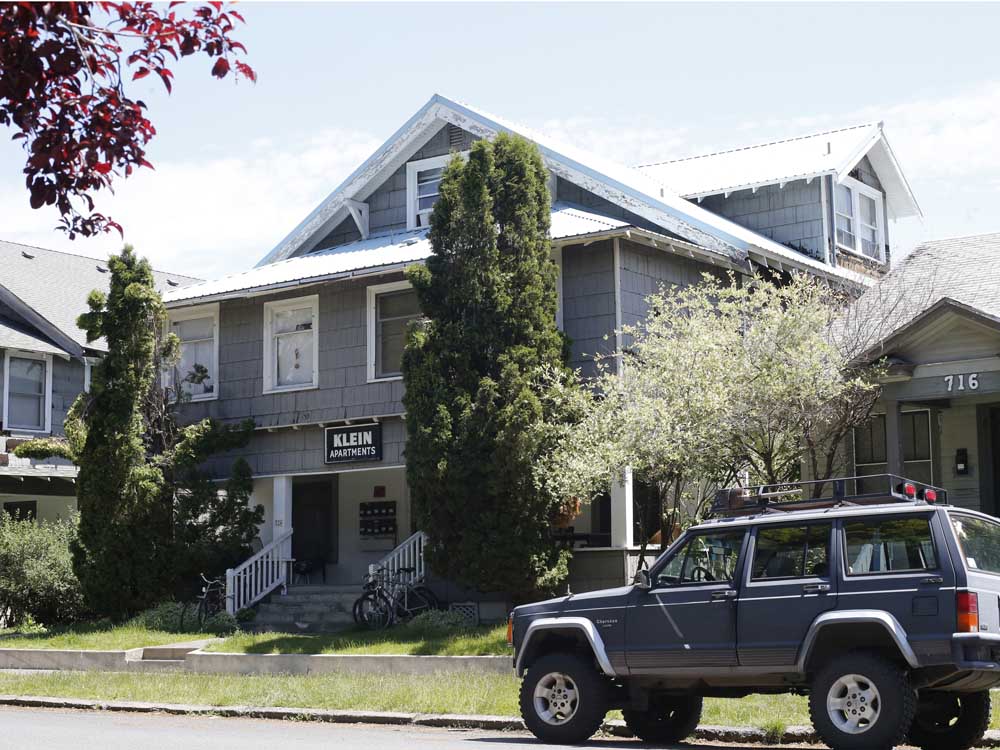Bend history: Century-old boarding houses still stand
Published 12:55 am Thursday, June 2, 2016

- Joe Kline / The Bulletin The Klein Apartments on NW Broadway Street in Bend as seen last week. The old boarding house still provides apartments for Bendites today.
{%comp-FFFFFE-br%}
Built a year apart more than a century ago, two former boarding houses downtown still serve as apartment complexes today. But despite some rumors of a possibly sordid past, records show The Altamont and the Klein Apartments were likely some of the straightest joints in town.
The Altamont, formerly referred to as Hotel Altamont, or the Altamont Hotel, sits at 734 NW Broadway St. in downtown Bend. Next-door to the right, at 724 Broadway, are the Klein Apartments.
{%rc-5232720,5239054%}
When asked whether she had heard rumors about the Klein Apartments, or The Altamont, formerly having been a brothel, Des Chutes Historical Museum Executive Director Kelly Cannon-Miller had a laugh.
That’s a popular rumor in Bend, she said, and likely in other towns, too. She hadn’t heard that either of the old boarding houses used to be brothels. Most of the brothels used to be on Greenwood Avenue, she said.
Tor Hanson, a member of the Deschutes County Historical Society board, said he hadn’t heard such rumors either. Instead, he found records showing The Altamont and Klein Apartments were rather respectable places.
Joseph Jacob Klein, or J.J. Klein, as he was called, moved to Bend in 1910. He hired the local contractor J.J. Cunningham to build Hotel Altamont in 1911. The Klein Apartments were built the following year in 1912, according to Bulletin archives.
The cost of the Klein Apartments was $8,500 with another $1,500 for furnishing, according to Klein’s statement in a Bulletin article from the time.
{%pl-5232721%}
Directories, the precursor to phone books, from around 1918 into the 1930s show Klein lived in the Klein Apartments with his family, which leads Hanson to believe the boarding house had more of a family atmosphere than that of a bordello. Early on, he sold Hotel Altamont to a Dr. E.R. Jackson, of Los Angeles, who later sold it to Miss Alice Spalding, of Bend. She would go on to own the boarding house for close to 20 years.
Spalding was an active member of the Methodist church and for many years was a member of the Women’s Civic League in Bend, according to her obituary in a 1934 issue of The Bulletin. Hanson said it seems she wanted Hotel Altamont to have a good reputation as a homey boarding house. Two 1920s ads in The Bulletin for the hotel built on that theme: “Another Name for Home” one ad claimed, adding “Steam heated rooms, well furnished and well kept with hot and cold running water.”
In another, it was called “The right place to get home cooked meals.” At $28 a month in 1922, Hanson estimates Hotel Altamont’s rent was on the high side.
Spalding’s ownership of Hotel Altamont spanned the years of Prohibition. And, as Hanson pointed out, Oregon Prohibition actually began four years earlier than most of the nation, in 1916. It continued through 1933.
Hotel Altamont saw a taste of the temperance movement inside its walls. The temperance movement was an anti-alcohol movement, in many instances led by upper-class women. Hanson found a local Woman’s Christian Temperance Union meeting was held at the boarding house on Nov. 6, 1929.
{%pr-5232722%}
In the same year, a number of reputable Bend men, from then-council chairman M.H. Symons to Ross Farnham, then-Deschutes County district attorney, gathered for a Boy Scout meeting at The Altamont, according to Bulletin archives.
“You can start seeing there’s a pattern,” Hanson said. “It’s not a sleazy hotel.”
Still, Spalding hit some bumps in the road in aiming to keep the hotel’s reputation clear.
In October 1919, with a tip from Spalding, two warrants were made for the arrests of J.D. Warner and A. Pope. The allegations: drunkenness and disorderly conduct. Warner pleaded guilty, paying a $5 fine. Pope, a resident of the hotel, appeared in court to tell the judge it was “something less than three fingers of bourbon” that “inspired him to song when he reached his room.” Spalding appeared in court to testify that Warner and Pope’s “vocal efforts” in Pope’s room “reminded her more strongly of a cat fight than anything else,” according to Bulletin archives.
“The court decided that a fine of $5 would satisfy justice, inasmuch as the defendant had already been severely lectured by Miss Spalding and had promised to sin no more.”
{%tl-F5E5CC, 000000, 2%}
Hanson said he found records showing hotel owners in the area caught serving alcohol at the time could be charged between a $100 and $500 fine, adding it made sense why Spalding wouldn’t have put up with the men’s drunkenness.
Hanson acknowledged it was unusual, and impressive, for a woman to have owned a boarding house for so long.
“In that time frame definitely,” he said. “That’s quite something.”
In 1934, Spalding died, and Klein died five years later in the Klein Apartments he still called home. By 1942, the Altamont Hotel began boarding federal employees for the war, including flight students who would train at Bend Airport.
“The fact that he lives there all of his life, he basically builds the apartment building and then lives there, I think both The Altamont and Klein tried to keep up a good reputation,” Hanson said.
— Reporter: 541-383-0325, kfisicaro@bendbulletin.com {%pc-5239057%}
“The fact that he lives there all of his life, he basically builds the apartment building and then lives there, I think both The Altamont and Klein tried to keep up a good reputation.” — Tor Hanson, member of the Deschutes County Historical Society board
For more stories from Central Oregon’s past, visit bendbulletin.com/history






